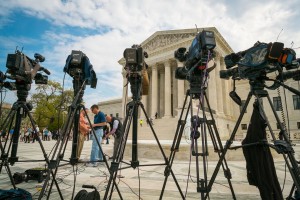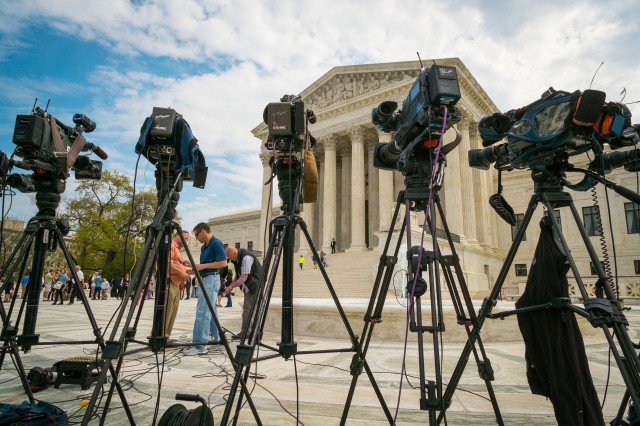
By Mark Sherman
Associated Press
WASHINGTON — Grappling with fast-changing technology, Supreme Court justices debated Tuesday whether they can protect the copyrights of TV broadcasters to the shows they send out without strangling innovations in the use of the Internet.
The high court heard arguments in a dispute between television broadcasters and Aereo Inc., which takes free television signals from the airwaves and charges subscribers to watch the programs on laptop computers, smartphones and even their large-screen televisions.
The case has the potential to bring big changes to the television industry.
There was a good measure of skepticism about Aereo’s approach, sometimes leavened with humor.
Chief Justice John Roberts declared at one point: “I’m just saying your technological model is based solely on circumventing legal prohibitions that you don’t want to comply with, which is fine. I mean, you know, lawyers do that.”
But several justices expressed concern that a ruling for the broadcasters could hamper the burgeoning world of cloud computing, which gives users access to a vast online computer network that stores and processes information.
Justice Stephen Breyer said the prospect makes him nervous.
“Are we somehow catching other things that would really change life and shouldn’t?” Breyer asked.
Paul Clement, representing the broadcasters, tried to assure the court it could draw an appropriate line between Aereo’s service and cloud computing generally. People who merely retrieve what they have stored should have no reason to worry, Clement said.
But David Frederick, representing Aereo, said the “cloud computing industry is freaked out about the case” because it sees its $10 billion investment at risk if the court were to hold that anytime music or an image is stored online and then retrieved, the copyright law would be implicated.
The discussion veered between references to Roku, a TV streaming device, and other high-tech gadgets on the one hand, and analogies to coat-check rooms and valet parking in an effort to make matters more understandable on the other. There was even Breyer’s quaint reference to a “phonograph record store.”
Aereo’s service starts at $8 a month and is available in New York, Boston, Houston and Atlanta, among 11 metropolitan areas. Subscribers get about two dozen local over-the-air stations, plus the Bloomberg TV financial channel.
In each market, Aereo has a data center with thousands of dime-size antennas.
When a subscriber wants to watch a show live or record it, the company temporarily assigns the customer an antenna and transmits the program over the Internet to the subscriber’s laptop, tablet, smartphone or even a big-screen TV with a Roku or Apple TV streaming device.
The antenna is only used by one subscriber at a time, and Aereo says that’s much like the situation at home, where a viewer uses a personal antenna to watch over-the-air broadcasts for free.



